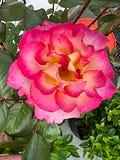Me and Orwell's Roses
PLUS: What does the myth of Prometheus and the history of "degenerate art" have to do with the creative process?
We got a theme this week, folks! Usually it’s chaos here at Slug HQ, but sometimes a good theme emerges, and how can I say no??
After putting my own creativity advice into some prose earlier this week, I went looking for more wisdom that rejects productivity culture from my favorite artists. I’ve curated some of what I found for paid subscribers this week, but first, I have to tell you all about my new rose bush.
His name is Rainbow (obviously). He is a Floribunda, and I still am not totally sure what that means, because there are like 700,000 types of roses? Humans got as obsessed with roses as we did with dogs and just made way too many kinds. But the tag says he’s not too fucked about soil and pH, so we will see if I can keep him alive. Rainbow could live for 20 years.
I had been planning to get a rose bush for Gray, who has taken to amateur floral design — I keep finding foraged flowers carefully arranged in little glasses of water around the house, an adorable habit I want to encourage — but I really had to temper my more pragmatic impulses.
“We can have a rose bush, but it has to be the kind bees like, without all the petals that cover up the pollen,” I told them. Of course, that’s the kind they’d been thinking of, those big, flamboyant blooms.
Exasperated, they looked at me and cried: “Can I just have one pretty thing??”
Turns out, roses are not just pretty — they’re edible and medicinal, but we don’t really see rose hips around much, because a lot of gardeners cut the dead flowers off before they have a chance to turn into fruit. (A side effect of that human shame I was musing about earlier this week!) Still, there’s a question here about beauty, about how much we allow ourselves pleasure just for pleasure’s sake.
George Orwell’s roses outlived him by 73 years. In her latest book, Rebecca Solnit visits these roses, still growing outside Orwell’s cottage in rural England. You may not think the author of the infamous dystopic novel 1984 would be pruning a rose bush between writing paragraphs about rat-based torture chambers, but Solnit chronicles a soft side of the political writer that kept him going through the horrors of war and authoritarianism he railed against.
She points out a curious moment in one of Orwell’s letters where he jumps from “This age makes me so sick” to talking about a baby hedgehog he found in his house. Solnit writes:
“It is often implied (or shouted) that if you enjoy hedgehogs you do not care about the evils of the age, but they routinely coexist in experience and imagination.”
And they must, really. How are we supposed to fight monsters if we don’t ever get to enjoy cute hedgehogs and beautiful roses? I’m realizing that pragmatic impulse to only plant “useful” things probably comes from my Inner Businessman, that annoying guy lodged in the back of my American brain who always wants me to “optimize” and “create value”. (Gross!)
But for me, gardening, like making art, is not about that. It’s about finding the joy I need to face my own existential dread. This passage from Solnit explains both perfectly and straight-up made me put the book down and cry:
“..because a garden is always a place of becoming, to make and tend one is a gesture of hope, that these seeds planted will sprout and grow, this tree will bear fruit, that spring will come, and so, probably, will some kind of harvest. It’s an activity deeply invested in the future.”
Already I want to plant more roses.
Diving Deeper: Chaos, Insurgency, and The Creative Process
There are a lot of new subscribers around here lately, so as a small penance for the paywall you’re about to hit (I’m sorry, I do not have a “real” “job”), I’ve pulled some relevant creative advice from the archives that I’ve been thinking about again in the intense energy of spring:
It still slaps! I stand by it! Get weird!
I’m often frustrated by popular creativity advice, because it’s usually about morning routines and productivity techniques, trying to norm yourself — all of which I find antithetical to my own creativity.
Keep reading with a 7-day free trial
Subscribe to Sluggish to keep reading this post and get 7 days of free access to the full post archives.



